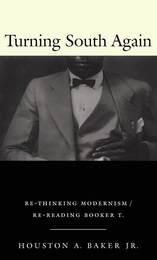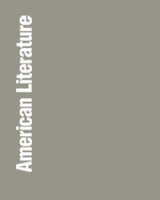4 books about Baker, Houston A.

American Literature at 75, Volume 76
Houston A. Baker Jr. and Priscilla Wald, eds.
Duke University Press
Since its founding in 1929, American Literature has been considered the preeminent journal in its field. In this special issue, which celebrates the landmark seventy-fifth anniversary of the journal, past and present editors assess the contribution the journal has made to literary studies by considering the journal's evolution: how it has departed from, remained loyal to, extended, qualified, rejected, or questioned Hubbell's original agenda.
[more]

Turning South Again
Re-Thinking Modernism/Re-Reading Booker T.
Houston A. Baker Jr.
Duke University Press, 2001
In Turning South Again the distinguished and award-winning essayist, poet, and scholar of African American literature Houston A. Baker, Jr. offers a revisionist account of the struggle for black modernism in the United States. With a take on the work of Booker T. Washington and the Tuskegee Institute surprisingly different from that in his earlier book Modernism and the Harlem Renaissance, Baker combines historical considerations with psychoanalysis, personal memoir, and whiteness studies to argue that the American South and its regulating institutions—particularly that of incarceration—have always been at the center of the African American experience.
From the holds of slave ships to the peonage of Reconstruction to the contemporary prison system, incarceration has largely defined black life in the United States. Even Washington’s school at Tuskegee, Baker explains, housed and regulated black bodies no longer directly controlled by slave owners. He further implicates Washington by claiming that in enacting his ideas about racial “uplift,” Washington engaged in “mulatto modernism,” a compromised attempt at full citizenship. Combining autobiographical prose, literary criticism, psychoanalytic writing, and, occasionally, blues lyrics and poetry, Baker meditates on the consequences of mulatto modernism for the project of black modernism, which he defines as the achievement of mobile, life-enhancing participation in the public sphere and economic solvency for the majority of African Americans. By including a section about growing up in the South, as well as his recent return to assume a professorship at Duke, Baker contributes further to one of the book’s central concerns: a call to centralize the South in American cultural studies.
From the holds of slave ships to the peonage of Reconstruction to the contemporary prison system, incarceration has largely defined black life in the United States. Even Washington’s school at Tuskegee, Baker explains, housed and regulated black bodies no longer directly controlled by slave owners. He further implicates Washington by claiming that in enacting his ideas about racial “uplift,” Washington engaged in “mulatto modernism,” a compromised attempt at full citizenship. Combining autobiographical prose, literary criticism, psychoanalytic writing, and, occasionally, blues lyrics and poetry, Baker meditates on the consequences of mulatto modernism for the project of black modernism, which he defines as the achievement of mobile, life-enhancing participation in the public sphere and economic solvency for the majority of African Americans. By including a section about growing up in the South, as well as his recent return to assume a professorship at Duke, Baker contributes further to one of the book’s central concerns: a call to centralize the South in American cultural studies.
[more]

Unsettling Blackness, Volume 72
Houston A. Baker Jr.
Duke University Press
This special issue of American Literature transcends the old debates surrounding black expressive culture and reexamines major African American texts through the lenses of modernism, progressivism, architecture, avant-gardism, hybridity, and Continental theory. With this arsenal of critical and theoretical tools, the scholars here declare that the concept of "blackness" is agile and dynamic, both unsettled and unsettling.
Articles in this issue address topics as rich and varied as the friendship between Richard Wright and Ralph Ellison; hybridity, montage, and the avant-garde in the works of Jean Toomer; and the interplay of eugenics and racial uplift in W. E. B. DuBois’s Crisis. One piece explores Langston Hughes’s use of bebop in Montage, and another considers the ways in which James Weldon Johnson’s Autobiography of an Ex-Coloured Man challenges assumptions about black music and its relationship to the "classics." The collection moves into a discussion of physical space when Arlene Keizer assesses Carolivia Herron’s Thereafter Johnnie, a novel in which the geography and architecture of Washington, D.C. construct as well as express the slave-owning, patriarchal culture.
Unsettling Blackness would be a valuable addition to the syllabus of any course grappling with the galaxy of issues surrounding African American literature and culture.
Articles in this issue address topics as rich and varied as the friendship between Richard Wright and Ralph Ellison; hybridity, montage, and the avant-garde in the works of Jean Toomer; and the interplay of eugenics and racial uplift in W. E. B. DuBois’s Crisis. One piece explores Langston Hughes’s use of bebop in Montage, and another considers the ways in which James Weldon Johnson’s Autobiography of an Ex-Coloured Man challenges assumptions about black music and its relationship to the "classics." The collection moves into a discussion of physical space when Arlene Keizer assesses Carolivia Herron’s Thereafter Johnnie, a novel in which the geography and architecture of Washington, D.C. construct as well as express the slave-owning, patriarchal culture.
Unsettling Blackness would be a valuable addition to the syllabus of any course grappling with the galaxy of issues surrounding African American literature and culture.
[more]

Violence, the Body, and the South, Volume 73
Houston A. Baker Jr. and Dana D. Nelson, eds.
Duke University Press
Violence, the Body, and “The South” is a boldly innovative contribution to a new Southern Studies, which provides a model of collaborative, intergenerational, interracial, interdisciplinary scholarship. This special issue of American Literature challenges the traditional division of the United States between “North” and “South,” revealing that the complexities of violence and pleasure, representation and illusion, innocence and guilt, gender and race exist in infinitely inflected combination in the Americas, not simply in the “South.”
This collection represents first-rate examples of gender, critical race, genre, and material culture studies. Topics ranging from epistemological and authorial rebellions marking Frederick Douglass’s Narrative and Charles Chesnutt’s The Marrow of Tradition to the twentieth-century labors of writers, such as Francisco Goldman and Helena María Viramontes, who work to make visible the complexities of “North” and “South” with respect to subordinated Latino/a bodies. William Faulkner is revisited in an essay on the internalization of “race” in Light in August. Guess Who’s Coming to Dinner and In the Heat of the Night are analyzed in a framework of homopolitical desire. Genre and regional studies combine in an energetic essay resituating Harriet Jacobs’s Incidents in the Life of a Slave Girl with respect to “Northern” fiction.
This collection represents first-rate examples of gender, critical race, genre, and material culture studies. Topics ranging from epistemological and authorial rebellions marking Frederick Douglass’s Narrative and Charles Chesnutt’s The Marrow of Tradition to the twentieth-century labors of writers, such as Francisco Goldman and Helena María Viramontes, who work to make visible the complexities of “North” and “South” with respect to subordinated Latino/a bodies. William Faulkner is revisited in an essay on the internalization of “race” in Light in August. Guess Who’s Coming to Dinner and In the Heat of the Night are analyzed in a framework of homopolitical desire. Genre and regional studies combine in an energetic essay resituating Harriet Jacobs’s Incidents in the Life of a Slave Girl with respect to “Northern” fiction.
Contributors. Houston A. Baker Jr., Jeannine DeLombard, Laura Doyle, Jennifer Rae Greeson, Andrea Levine, Dana D. Nelson, Ana Patricia Rodríguez, Bryan Wagner
[more]
READERS
Browse our collection.
PUBLISHERS
See BiblioVault's publisher services.
STUDENT SERVICES
Files for college accessibility offices.
UChicago Accessibility Resources
home | accessibility | search | about | contact us
BiblioVault ® 2001 - 2024
The University of Chicago Press









